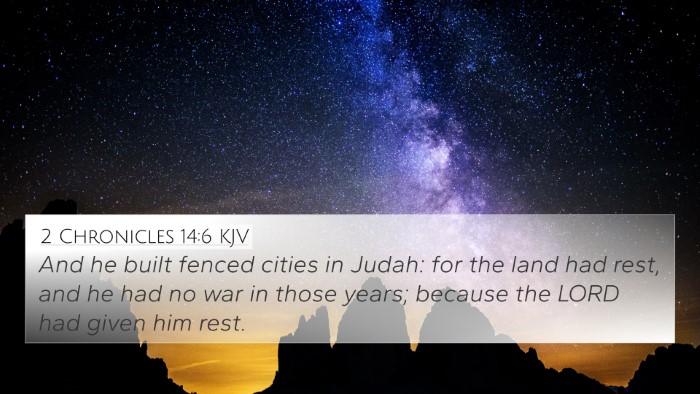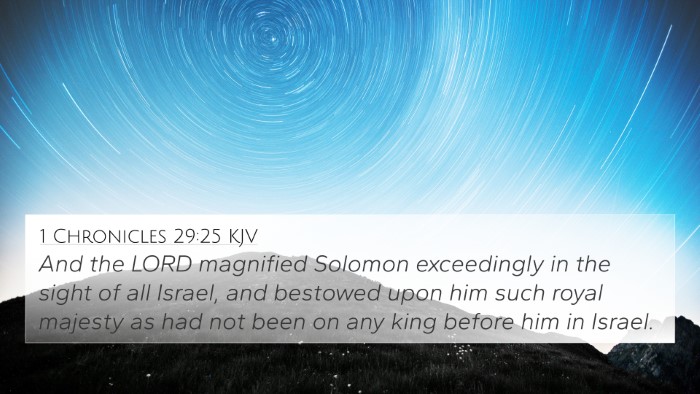Understanding 2 Chronicles 17:12
“And Jehoshaphat became increasingly powerful, and he built fortresses and storage cities in Judah.”
Summary of 2 Chronicles 17:12
This verse details the reign of King Jehoshaphat of Judah, highlighting his growing power and fortifications he established to protect the kingdom. His efforts represent a blend of military preparation, economic stability, and a commitment to the wellbeing of Judah.
Context and Background
Jehoshaphat was the son of Asa and ruled over Judah during a time of relative peace and prosperity. In this context, his fortification efforts can be understood as both a practical response to potential threats and a demonstration of his leadership and wisdom.
Commentary Insights
-
Matthew Henry:
Henry emphasizes that Jehoshaphat's actions were associated with his faith in God. By strengthening Judah, he aimed to foster security among the people, which reflects a leader's responsibility to protect his subjects.
-
Albert Barnes:
Barnes notes that Jehoshaphat’s preparations were indicative of both strength and prudence. His reign not only focused on military might but also on establishing a stable socio-economic foundation in Judah.
-
Adam Clarke:
Clarke highlights the spiritual dimension, recognizing Jehoshaphat’s desire to lead Judah in righteousness, thereby ensuring that God’s favor was upon the kingdom, which in turn, facilitated its prosperity and growth.
Connections to Other Bible Verses
In exploring 2 Chronicles 17:12, certain Bible verses echo similar themes of leadership, strength, and God’s favor:
- 2 Chronicles 26:5: “He sought God in the days of Zechariah, who instructed him in the fear of God; and as long as he sought the Lord, God made him prosper.”
- Psalm 127:1: “Unless the Lord builds the house, those who build it labor in vain. Unless the Lord watches over the city, the watchman stays awake in vain.”
- Isaiah 54:14: “In righteousness you shall be established; you shall be far from oppression, for you shall not fear, and from terror, for it shall not come near you.”
- Proverbs 21:31: “The horse is made ready for the day of battle, but the victory belongs to the Lord.”
- Proverbs 29:2: “When the righteous are in authority, the people rejoice; but when a wicked man rules, the people groan.”
- 2 Chronicles 20:15: “He said, ‘Listen, all you of Judah and you inhabitants of Jerusalem, and you, King Jehoshaphat! Thus says the Lord to you: ‘Do not be afraid nor dismayed because of this great multitude, for the battle is not yours, but God’s.’”
- 1 Chronicles 11:9: “So David went on and became great, and the Lord of hosts was with him.”
Thematic Connections
The themes present in this verse can be linked to broader scripture contexts that discuss divine favor upon leaders, the importance of preparation, and the role of righteousness in governance. These connections can be particularly enlightening for those studying the character of Jehoshaphat:
- Divine Protection: Psalm 91:1-2 reinforces the idea of God as a refuge and fortress.
- Military Strategy: Proverbs 20:18 discusses the importance of counsel in warfare.
- Prosperity through Righteousness: Proverbs 14:34 states that righteousness exalts a nation.
Cross-Referencing Biblical Texts
To deeply understand 2 Chronicles 17:12, it is useful to apply Bible verse cross-references. These connections enhance one’s comprehension of the scripture and its implications within both the Old and New Testaments:
- Linking Jehoshaphat’s reign with David’s leadership qualities highlighted in 1 Samuel 16:7.
- Cross-references to Luke 1:32-33 to explore the messianic lineage and the ultimate kingship of Jesus.
- Considerations of the spiritual state of Judah as compared with teachings about God's judgment in the prophetic books, such as Jeremiah 18:7-8.
Conclusion
2 Chronicles 17:12 serves as a noteworthy reminder of the balance between physical preparation and spiritual grounding in leadership. Jehoshaphat’s diligence in fortifying Judah exemplifies a responsible ruler, one whose efforts are underpinned by a desire for righteousness. By cross-referencing this verse with others, believers can gain a broader understanding of God’s principles regarding leadership, protection, and divine favor.
Engaging with these scriptures can enhance personal study, sermon preparation, and facilitate a deeper connection to the overarching narrative of the Bible, encompassing themes from historical, prophetic, and poetic writings.











